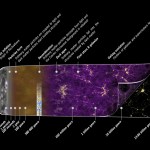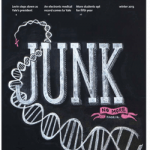Philosophy
We've got an interesting seminar coming to Morris next Thursday.
Thursday, February 18, 2016, 5 p.m.
Location: Imholte Hall 109
The origination of novel structures has long been an intriguing topic for biologists. Over the past few decades it has served as a central theme in evolutionary developmental biology, in part to highlight explanatory gaps in the population genetic framework of standard evolutionary theory. Yet, definitions of evolutionary innovation and novelty are frequently debated and there remains disagreement about what kinds of causal factors best explain the origin of…
Sadly, a young man in England has been diagnosed with stage IV cancer -- and he really is an atheist in a metaphorical foxhole, and it hasn't changed his opinion of religion.
Between now and last Wednesday I’ve worried about various things, but one thought that stands out is religion. Before I go into more depth, I’ll stress that I’m an atheist. Religion, the way I see it, is a reactionary and backward tendency that has stood alongside man throughout history, yet has always blinded communities and corrupted rational thought. As society has advanced, so has our depth of knowledge and…
You can almost hear the sound of PZ Myers' palm hitting his face as "a couple of vegetarian philosophers with no knowledge of biology" urge humanity to end predation worldwide—so that no more zebras have to suffer at the fangs of a lion, and no more mice at the talons of an owl. Their plea on behalf of prey species, inspired by the model culling of Cecil the lion, calls carnivory simply 'unnecessary;' PZ writes, "it’s as if they are completely unaware of the fact that predation maintains and increases biodiversity, or that there’s more to wildlife than mammals and birds, or that life is a…
Aristotle thought that there could be no lasting void in the natural order, that any emptiness would be instantaneously filled. Of course Aristotle was full of batty ideas. But this one came to be rephrased by philosophers and Vulcans alike as "nature abhors a vacuum," enduring as a powerful metaphor if not a precisely factual truth. In terms of critical thinking, scientists too abhor a vacuum, and are usually eager to fill in the blanks. On Pharyngula, PZ Myers criticizes a review of long-established brain anatomy, freshened with primary colors and a hypothesis that makes no sense.…
When I heard that Steven Pinker had written a new piece decrying the accusations of scientism, I was anxious to read it. "Scientism" is a blunt instrument that gets swung in my direction often enough; I consider it entirely inappropriate in almost every case I hear it used.
Here's the thing: when I say that there is no evidence for a god, that there's no sign that there is a single specific thing this imagined being has done, I am not unfairly asking people to adopt the protocols of science — I am expecting to judge by their own standards and expectations. They are praying to Jesus in the…
“...the magnificence of the Universe as revealed by modern science might be able to draw forth reserves of reverence and awe hardly tapped by the conventional faiths.” -Carl Sagan
As many of you know, I'm fortunate enough to live in a city that values science and scientific knowledge so highly that the our local news station, KGW, routinely brings on scientists to talk about the lastest developments in our endeavors to understand the Universe around us. Just last week, I was invited to share five wonderful minutes of airtime with the viewers of not just Portland, OR, but (thanks to the web)…
There's another paper out debunking the ENCODE consortium's absurd interpretation of their data. ENCODE, you may recall, published a rather controversial paper in which they claimed to have found that 80% of the human genome was 'functional' — for an extraordinarily loose definition of function — and further revealed that several of the project leaders were working with the peculiar assumption that 100% must be functional. It was a godawful mess, and compromised the value of a huge investment in big science.
Now W. Ford Doolittle has joined the ranks of many scientists who immediately leapt…
Philosophers are still grumbling about Lawrence Krauss, who openly dissed philosophy (word to the philosophers reading this: he recanted, so you can put down the thumbscrews and hot irons for now). This is one of those areas where I'm very much a middle-of-the-road person: I am not a philosopher, at least I'm definitely not as committed to the discipline as someone like Massimo Pigliucci, but I do think philosophy is an essential part of our intellectual toolkit — you can only dismiss it if you haven't thought much about it, i.e., aren't using philosophy at all.
So I'm pretty much in…
I had originally intended to devote this post to discussing some of the minutiae in Massimo Pigliucci's essay. In light of some of the comments on the previous post, however, I've decided it would be more useful to speak generally about why I get so annoyed when charges of scientism are casually thrown around.
I actually agree with some of Pigliucci's specific criticism's of Krauss. For example, in his exchange with Julian Baggini, Krauss said this:
Ultimately, I think our understanding of neurobiology and evolutionary biology and psychology will reduce our understanding of morality to…
Massimo Pigliucci is going on about scientism again. His target -- surprise! -- is Lawrence Krauss, specifically this exchange between Krauss and philosopher Julian Baggini, published in The Guardian.
When I first became aware of “scientism,” a while back, it was invariably a charge leveled by religious people at scientists. To be accused of scientism was to be accused of being insufficiently respectful of religion. More specifically, it was to be accused of not acknowledging religious “ways of knowing,” as legitimate. Since I don't think religious ways of knowing should be accorded any…
I'm currently reading Scott Aikin's and Robert Talisse's book Reasonable Atheism: A Moral Case for Respectful Disbelief. I'm finding it a strange experience. I agree with most of their substantive points, but I always find it off-putting when writers start boasting of their own civility and respectfulness.
I had to smile, though, when I came to this:
We take the Ontological Argument as the litmus test for intellectual seriousness, both for atheists and religious believers alike. Anyone who takes the question of God's existence seriously must grapple with this fascinating argument.…
I have a new post up over at HuffPo. I discuss, and find wanting, the argument made by Daniel Sarewitz in this op-ed from Nature. Here's a taste:
Sarewitz' argument backfires in that it calls our attention to the key difference between science and religion. It is sometimes said that religion answers questions about meaning and purpose, but this is not accurate. The correct formulation is that religion makes assertions about meaning and purpose. Sorely lacking is any reliable method for establishing the correctness of those assertions. Science's contribution to these conversations is a set…
Massimo Pigliucci has a post up that is partly about the issue of realism vs. anti-realism in the philosophy of science. He describes the issue as follows:
To put it very briefly, a realist is someone who thinks that scientific theories aim at describing the world as it is (of course, within the limits of human epistemic access to reality), while an anti-realist is someone who takes scientific theories to aim at empirical adequacy, not truth. So, for instance, for a realist there truly are electrons out there, while for an anti-realist “electrons” are a convenient theoretical construct to…
I will now follow-up on my post from Tuesday. In that post I made some criticisms of a recent talk given by philosopher Elliott Sober at the University of Chicago, the video of which is available here. In the ensuing comments, couchloc linked to this paper that Sober had written, the early sections of which discuss essentially the same material as what was presented in the talk.
Since it seems to me that the paper confirms everything I said in my original post, I felt it was worth diving in once again. Let me preface this, however, with something that really should go without saying.…
If you spend any significant amount of time doing science or mathematics then some amount of philosophical reflection is inevitable. At some point you are going to take a step back and wonder what it is you are actually doing. I think it is good that there are people out there who ponder such things professionally.
That said, I think it is also true that scientists and mathematicians tend to view the philosophers of their disciplines as a bit eccentric. As far as I know, I have never met a mathematician who finds it interesting to ask whether numbers exist, or who enjoys debating the…
Why has our life expectancy increased so much since the American Revolution?
According to Presidential candidate Rick Santorum: "Because God says they have rights."
What about the role of sanitation, nutrition, education, medicine?
This is an example of religious faith clashing with reason, with all due respect to those with faith.
From "Human Longevity: The Major Determining Factors" by Joseph A. Knight, M.D.:
Wealth, and an affluent environment, significantly correlate with life expectancy as shown by a marked increase in life expectancy over the past century due to the marked…
My earlier post on this subject was entitled “What is Scientism?” because, while I have seen the term thrown around in a number of venues, I have never been entirely sure what it means. Having had a chance now to digest some of the arguments raised in the comments, as well as the thoughts expressed at other blogs, I think it's time to go another round.
The first point I made in my earlier post was that, in the context of science/religion disputes, to be accused of scientism was to be accused of being insufficiently respectful towards religion. A perfect example of what I had in mind is this…
Michael Ruse has now written a second post on the subject of scientism. He gets down to business in the second paragraph:
My three examples of nonscientific truths were mathematics, morality, and answers to those kinds of philosophical meta-questions, like - “What is the truth status of claims that only scientific claims are knowledge claims?” I will leave the first and third categories for discussion at another time, although frankly I will say that if someone really thinks the Euler identity (my example) is a generalization from experience then they are in the right state of mind to…
If you spend much time involved in science/religion discussions, you will inevitably hear the term “scientism” thrown around. Usually it is hurled as an epithet. In practical terms, to be accused of scientism is usually to be accused of being insufficiently respectful of religion.
But I've never entirely understood what scientism actually is. The usual definition is that scientism is the blinkered belief that science is the only reliable “way of knowing,” but this is vague until we have sharp definitions of “science” and “way of knowing.” Philosophers have devoted no small amount of…
Writing at the Huffington Post, John Blumenthal offers a humorous take on intelligent design:
Thanks to Michele Bachmann, the tired concept of Intelligent Design has once again become a topic of conversation among Creationists, most of whom, ironically, often sound like Neanderthals. In case you don't know, this boneheaded theory claims that the human body is simply too remarkable to have come into being through millions of years of haphazard evolution, and that some super-intelligent deity must have been the engineering wizard behind the miracle of our anatomies.
Miracle? Really? If you're…




